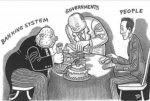- Joined
- Sep 3, 2011
- Messages
- 34,817
- Reaction score
- 18,576
- Location
- Look to your right... I'm that guy.
- Gender
- Undisclosed
- Political Leaning
- Centrist
Who *owns* tax money? In a literal sense. I see this point made often, usually by people right-of-center when talking about government spending, and school vouchers especially seems to be a popular catalyst for conversation.
Once taken from the citizen, does the government own it? Does the citizen(s) own it? If so, is it all owned collectively by all the citizens, or do people only own what they paid? As in if Joe Schmoe paid in $140, he lays claim to how that $140 is spent, but no more?
Once taken from the citizen, does the government own it? Does the citizen(s) own it? If so, is it all owned collectively by all the citizens, or do people only own what they paid? As in if Joe Schmoe paid in $140, he lays claim to how that $140 is spent, but no more?

